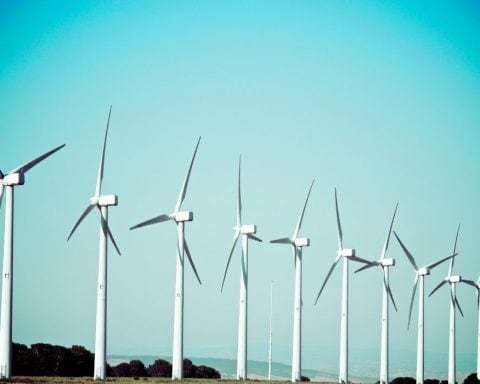With the federal government set to release its new climate plan this month, the battle is heating up over how it will rein in emissions from the country’s oil and gas sector.
In a report released March 16, the Public Policy Forum laid out a “leadership blueprint” for Canada’s net-zero transition that urges the federal government to help finance the sector’s efforts to reduce emissions. The independent think tank counts among its members Canada’s largest oil companies, as well as provincial and federal governments, banks and industrial corporations. Its report argues that public financing for the oil and gas industry’s emission reductions is the best way to achieve the government’s net-zero goals. And it insists Canadians’ overall well-being can be safeguarded only through the maintenance of a vibrant, export-oriented fossil-fuel sector.
The Public Policy Forum report contrasts its proposed “aggressive decarbonization” approach with the calls from many environmental organizations for the government to force the oil and gas sector to cut production if companies can’t or won’t reduce emissions consistent with Canada’s international commitments.
More than 400 scientists and academics signed a letter in January urging the federal government to kill any plan to provide a tax credit to spur industry investment in carbon capture, utilization and storage (CCUS), one of the key tools companies propose to use to reduce their greenhouse gas emissions. The group argued that society must quickly phase out our reliance on fossil fuels, and a CCUS tax credit would only prolong our dependence.
Environment Minister Steven Guilbeault told Reuters on March 15 that the updated climate plan due soon will not include specifics on how Ottawa will impose a declining cap on oil and gas greenhouse gas (GHG) emissions. More consultation is needed, he said. Clearly, the governing Liberals are facing fierce lobbying from the corporate sector as well as environmental groups over the fate of the industry.
In an interview, Public Policy Forum chief executive Edward Greenspon argued that the accelerated phase-out approach proposed by environmental organizations would be unlikely to succeed, and would create a backlash among citizens against a net-zero climate goal because of the associated costs. However, he added, the decarbonization effort must speed up.
“We’re just not moving with the haste we need to move,” Greenspon said. “We need to get on an aggressive decarbonization pathway.”
The think tank’s analysis makes some important points about the political and economic challenges we face in the energy transition. It calls for an “all hands on deck” effort to drive investment into emission reductions and technologies like clean-burning hydrogen, small nuclear reactors and carbon capture and sequestration.
We’re just not moving with the haste we need to move.
-Edward Greenspon, chief executive of Public Policy Forum
However, it falls well short as a blueprint for a net-zero future, given its narrow focus on defending the oil and gas sector. It ignores the role that demand-side policy driving efficiency and conservation must play. And it relies on some dubious assumptions in arguing for public financial support for a growing oil industry and asserting that the companies are indeed capable of “decarbonizing.”
All evidence to date suggests Ottawa will have to impose a tougher regime of carbon pricing and regulations to force the sector to allocate the capital needed to meet its environmental obligations. With the companies enjoying windfall profits as a result of Russia’s invasion of Ukraine, they can self-fund the big-ticket technological changes they are promising, although Ottawa could provide some insurance that protects against policy changes that would undercut those investments.
While the Public Policy Forum describes its report as a blueprint for net-zero transition, the report does not convey much confidence that Canada – or indeed the world – can get there. Sadly, that is not an unrealistic appraisal, given the massive economy-wide changes that are needed and the ongoing political resistance to making them, both here and abroad.
However, the report’s authors do not dwell on the enormous consequences if we fail – the horrific impacts not only for our children and grandchildren but for the species with whom we share this planet. It also has to be said that many of the industry and government people with seats around the Public Policy Forum’s table have for years been dismissing the urgency of the climate crisis, throwing up roadblocks to action and downplaying the role that Canada should play.
One of the report’s authors was Wayne Wouters, once Ottawa’s top civil servant and now a strategic advisor at McCarthy Tétrault LLP. He acknowledged in an interview that the oil industry has failed to make the investments it should have.
However, Wouters insisted that “times have changed” and that the companies face pressure not only from government, but from international investors like pension funds and banks that have their own net-zero commitments. The trick, he argued, will be to reduce emissions without cutting production.
“We definitely agree we need to reduce our consumption of oil and gas as quickly as we can, but that doesn’t necessarily imply that we need to reduce our production of oil and gas,” Wouters said.
The report points to the Oil Sands Pathways to Net Zero alliance as indicative of the industry’s new-found commitment to tackling climate change. Echoing the six producers who make up the alliance, the Public Policy Forum argues that effort will require government–industry partnership with shared financing.
However, the oil sands’ pathways proposal is seriously flawed, and not only because it relies on billions of dollars in government support to make it work. On March 1, the Pembina Institute published a review of the pathways proposal and raised some red flags. For one thing, it would not align with Canada’s Paris Agreement commitment to reduce GHGs by between 40 and 45% by 2030 from 2005 levels.
We definitely agree we need to reduce our consumption of oil and gas as quickly as we can, but that doesn’t necessarily imply that we need to reduce our production of oil and gas.
-Wayne Wouters, strategic advisor at McCarthy Tétrault LLP
The Public Policy Forum report itself gives little attention to the 2030 commitment, despite federal legislation that requires Ottawa to meet short-term goals on the road to net-zero in 2050. Its one reference calls on industry to put emissions “on a clear and sustainable downward track” this decade “in support of” Canada’s 2030 target.
Under the pathways proposal, the oil sands sector would cut GHG emissions by 22 megatonnes by 2030, leaving them 74% higher than in 2005, based on Environment Canada’s figures for 2019. That under-performance would force other sectors to make up the difference.
Pembina also noted the challenges the industry faces in reducing emissions dramatically over the next three decades. Many of the technologies it proposes to deploy – including small nuclear reactors and solvent-based extraction techniques – are not commercially available today and are risky bets in terms of cost and scalability.
Carbon capture is a viable technology to reduce emissions in a number of oil sands operations where the carbon dioxide stream is highly concentrated. However, most CO2 is emitted in low concentration streams, and the efforts to capture it will be challenging and expensive, Pembina concluded.
Analyst David Sawyer of the Canadian Climate Institute suggests Ottawa could provide financial backing for CCUS pipelines and other infrastructure while leaving the companies to finance their own capture projects. The federal government could also provide some form of guarantee on the value of emission reductions to protect the companies against the risk that a future government would change policy and render their investment worthless.
The Public Policy Forum report over-estimates how much global demand there will be for oil if the world can get itself on a net-zero pathway. The think tank notes that the International Energy Agency, “in some scenarios,” concludes that oil demand will be between 30 million and 50 million barrels per day by 2050. However, those scenarios would leave us well off the goal of limiting warming to 1.5°C. The IEA’s net-zero scenario – which targets that 1.5°C threshold – would leave global oil demand at 24 million barrels.
The Public Policy Forum argues that its proposed climate strategy would force oil companies to “sink or swim” – either remain competitive in a net-zero world or go out of business. But it would provide life preservers that would keep many afloat when the imperatives of a carbon-constrained world would deal a different fate.





